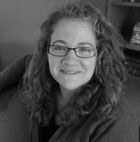One of the things that can be hardest about watching our children grow into adolescence and young adulthood is dealing with our own hopes and fears about their sexuality. Will they make choices that are consistent with the values we tried to teach them? Will they be safe? Will they get involved with caring people who treat them with the respect they deserve? What if they get hurt?
As a counselor at Hillel UW, I often have the opportunity to talk with young people about their sexual lives. I can tell you this: young adults have a wide range of experiences as they begin to explore their sexuality, and it is complicated. Many are struggling to understand and express their own desires. Many are learning how to ask for the things they want and say no to the things they don’t, and sometimes it goes well, and sometimes it doesn’t. Many are learning to navigate the intense and complex emotions of jealousy, desire, insecurity and heartbreak.
Some are learning how to regulate their alcohol use at the very same time that they explore their sexuality, and the results of that combination are complex and often messy. Some have parents or other safe adults they can talk with; some don’t. Some are not being sexual with others, by choice or not by choice, and have complex feelings about this. Some are engaging in relationships and behaviors they fear their parents would not understand or approve of, and they keep their choices to themselves. Some are having wonderful experiences; some are having ok experiences that they learn from; and, some are having painful experiences that hurt them in a deep way.
As parents, there are foundational skills that we can begin to build, in a developmentally appropriate way, very early in our children’s lives.
Teach your children about the importance of consent. It is important for children to learn that they have the right to decide what they will and will not do with their own bodies and that other people have this right also. Of course, there are some things that are not optional, and families will differ on where they draw this line. For example, we may set limits in our homes that medicine, homework, chores, caring for pets, and maintaining basic hygiene are not things that kids have the option to decline. We can, however, teach them early on that they are not required to accept hugs, kisses or tickles they do not want. One approach is to offer options: “Grandma is leaving. Would you like to give her a hug, a high-five, a fist-bump, or a wave?” We can also teach children to check in with others and make sure that they have their friends’ consent. This will be an essential practice for healthy relationships later on. For example, “You are all chasing Micah. Is he ok with that? Let’s make sure that he is enjoying being chased. If he’s not ok with it, we’ll need to stop. This excellent article is full of ideas for teaching kids consent throughout their development.
Teach your children to listen to their bodies and to their instincts. The best way for a person to know what they do and do not want in their sexual relationships is to listen to themselves. Our bodies tell us when we feel safe, happy, engaged or curious – and they also tell us when we feel threatened, uncomfortable or scared. Unfortunately, we are often taught to silence these cues in favor of being polite and easy-going, and this can make it harder for young adults to know what they do and do not want. From very early on in their lives, we can teach our children to listen for their own responses. You can do this by narrating your own responses and asking about theirs. For example, “Those people seemed very angry with each other. They were really yelling. How did you feel when we were near them? I felt uncomfortable and a little unsafe, which is why I crossed the street with you. What was it like for you?”
Look for Danica’s thoughts on boundaries, values and support in Part 2.
 By Danica Bornstein
By Danica Bornstein
Danica Bornstein, LICSW, is the Clinical Counselor at Hillel UW. The Hillel Counseling Program is a joint project of Hillel UW and Jewish Family Service and provides counseling for Jewish young adults aged 18-32.
Feature image by Bailey Foster.



